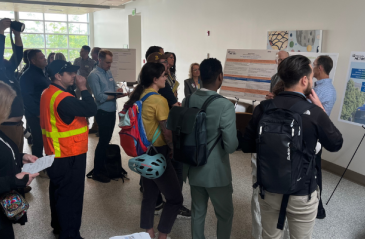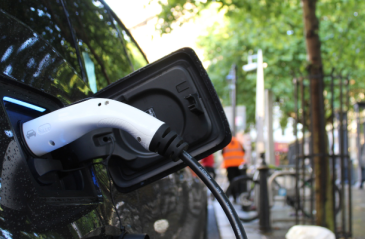
The information barriers holding back climate action and how to break them

The digital economy in the Middle East, North Africa and Turkey has great potential
Share articleLeaders need to recognise that digital success requires a holistic approach, says @drdean58
Share articleBetter healthcare, education and financial inclusion can all result from digital technology
Share articleWe put our vision for government into practice through learning partner projects that align with our values and help reimagine government so that it works for everyone.
Four thousand years after unicorns were described in Mesopotamian texts, modern-day unicorns have emerged in the region in the shape of the online retailer souq.com, bought by Amazon for nearly US$600m, and the ride-sharing company Careem, valued at over US$1b. Thousands of other startups attracted roughly US$1b of investment in 2016 alone.
The digital economy in the Middle East, North Africa and Turkey (MENAT) has great potential. The population is young and digitally savvy. Social media are extraordinarily popular and play a big role in shaping public opinion. Hackathons and other startup events, including those for industrial applications, attract thousands of entrepreneurs, designers and software developers. Encouragingly, women are well represented at such events.
Of course, the region faces very real challenges, too. Some of the world's richest populations are neighbours to war-torn, violent or desperately poor states. Displaced persons account for more than a third of the population in Lebanon, Palestine and Jordan, and roughly 30 percent of 15- to 24-year-olds are unemployed. A significant and pernicious digital gender gap exists, particularly in the Arab world, where 25 percent more men than women use the internet.
Yet farsighted governments in the region see the potential of the digital economy and the opportunities it offers for better healthcare and education and greater financial inclusion. They realise that a reduction in e-friction, which measures the barriers to the development of the digital economy, can boost GDP by 2 to 3 percent. Some have developed ambitious goals and defined concrete plans: Saudi Arabia's “National Transformation Program 2020” focuses on digitally transforming the Kingdom, and the internet of things, blockchain, and artificial intelligence are at the core of the ”Smart Dubai 2021” initiative. Several Middle Eastern countries are racing to become fintech hubs for Islamic banking.
Today, MENAT's internet penetration is similar to China's and much higher than India's, yet these country's digital economies dwarf MENAT's by a considerable margin. Use of YouTube, Twitter and Facebook is very high - indeed Saudis use YouTube on a per capita basis more than any other country globally - but relatively little relevant local content exists.
Relevance starts with people being able to enjoy digital media in a language they feel comfortable with, yet the English language is used on over 70 percent of sites in the MENAT region, and only 5 percent of popular web content is hosted there. But relevance is more than just a question of language - the content, services and applications need to be engaging, too, and this requires a vibrant local digital ecosystem comprising a broad range of local, online offerings, including government services.
There is no digital silver bullet. Whatever their priorities, leaders need to recognise that success requires a holistic approach and the involvement of stakeholders from government, the private sector, NGOs and civic society. Governments can lead by supporting long-term efforts in four areas.
Provide ubiquitous, affordable connectivity. Today, the region's poorest households would need to pay a third of their disposable income to afford mobile broadband. Addressing this challenge requires a long-term digital strategy, including a national broadband plan and the establishment of a transparent and predictable regulatory framework.
There also needs to be more international bandwidth, especially for intra-regional connectivity, as well as competition and collaboration between telecom companies. Some countries remain two-company markets in mobile telephony - network-sharing can encourage investments, especially in remote areas.
Governments should experiment with different pricing models for internet services, including service-specific plans and zero-rated services. And they also need to provide access to carrier-neutral internet exchange points. The lack of adequate infrastructure through which internet service providers exchange traffic drives up latency and cost, because most local traffic is routed through Europe.
Make relevant content available. Ubiquity and affordability are no substitute for local language content. This will include government digital services, because they stimulate internet engagement - due to their relevance to everyday life. A vibrant startup landscape is also needed - just one startup per day is founded in the Middle East, a small fraction of the number in the US.
This means that governments should encourage the development of fintech. Most countries in the region rank poorly in terms of retail access to financial services and financial inclusion. We also need to get small and medium-sized enterprises (SMEs) online, as this accelerates their growth. Digitally savvy, “micro-multinational” SMEs are well placed to trade internationally.
Build digital capabilities. General literacy levels are high, but governments can improve digital capabilities by encouraging edtech startups, which create and disseminate digital content to equip children with digital skills. Such capabilities will also be boosted by supporting the development of entrepreneurial skills through tech hubs, encouraging the creation of jobs requiring digital skills, and creating digital literacy programmes for those no longer in formal education.
Establish supportive policies and practices. A consistent, predictable and digitally relevant regulatory framework is critical to the digital economy. This requires addressing restrictions on internet content and intermediaries. There also needs to be legislation that supports local hosting, as this encourages the development of local language content.
By liberalising the registries for country code top-level domains, governments can help increase customer choice and reduce prices. They should also promote the free flow of data across borders, because this encourages e-commerce, fuels economic growth, and drives innovation. We also recommend the harmonisation of regulations in the region, including the avoidance of data localisation requirements.
The internet has become a global resource, connecting billions of people and influencing their lives in myriad ways. The opportunities for MENAT are huge.
Some may baulk at the size of the challenges involved, but government leaders and policymakers should ask themselves what the costs of inaction are - the costs of not connecting the unconnected, the costs of not pursuing a digital transformation of their economies, the costs of not equipping their populations with the necessary digital skills. These are high, too. For farsighted leaders, the answer will be clear.
* * * *
Want to read more? Then check out the longer version of this article
The author would like to thank the numerous entrepreneurs, businesspeople, and policymakers whose insights contributed to this article. Thanks also go to Sogand Ghorbani in Tehran, Houssem Kaabi in Tunis, and Mehmet Karacan in Istanbul for their support.












